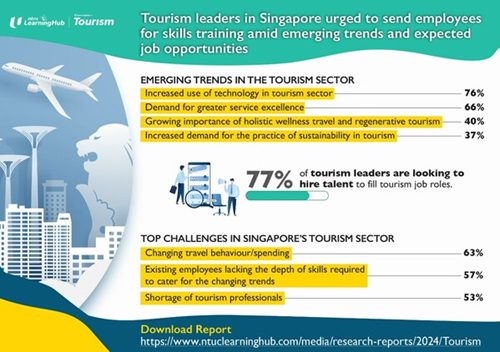![]() In the heart of Southeast Asia, Singapore’s tourism sector stands at a pivotal juncture, navigating through a landscape transformed by technological advancements and evolving consumer expectations. The NTUC LearningHub’s Industry Insights Report 2024 on Tourism sheds light on the imperative for skills training amidst these dynamic changes, painting a picture of a sector ripe with opportunities yet challenged by a skills gap that threatens to hinder its progress.
In the heart of Southeast Asia, Singapore’s tourism sector stands at a pivotal juncture, navigating through a landscape transformed by technological advancements and evolving consumer expectations. The NTUC LearningHub’s Industry Insights Report 2024 on Tourism sheds light on the imperative for skills training amidst these dynamic changes, painting a picture of a sector ripe with opportunities yet challenged by a skills gap that threatens to hinder its progress.
With the tourism industry rebounding robustly from the setbacks of the COVID-19 pandemic, leaders within this vibrant sector are facing a conundrum. On one hand, the emergence of new travel behaviors and spending patterns, coupled with a dire need for professionals adept in modern tourism practices, underscores a pressing challenge. On the other hand, the sector’s adaptation through technology and a renewed focus on sustainability and wellness offers a gleaming vista of opportunity.
A startling revelation comes to light despite these promising prospects: less than half of the tourism sector’s leaders have prioritized sending their employees for tourism-related training. This gap in skills development signals a potential stumbling block in harnessing the full potential of the sector’s evolution.
The report meticulously outlines the emerging trends shaping the future of tourism in Singapore. From the surge in technology use, underscored by the adoption of AI chatbots and contactless payment systems, to a growing demand for sustainable and wellness-focused travel experiences, the landscape is changing at an unprecedented pace. Yet, the sector’s readiness to meet these demands hinges on its workforce’s ability to adapt and grow through targeted skills training.
Service excellence emerges as a critical area for development, with a stark contrast between the perceived and actual quality of service marking a call to action for tourism leaders. The push towards sustainability is equally compelling, with a significant portion of leaders acknowledging the integration of sustainable practices as beneficial and essential for future success.
The insights from leaders at the helm of Singapore’s tourism, including the Singapore Tourism Board and Resorts World Sentosa, echo a unanimous sentiment: a paradigm shift from filling job roles to cultivating a culture of continuous learning and skills enhancement. This approach is about staying relevant and securing a competitive edge in an increasingly globalized market.
Mr. Tay Ee Learn’s commentary encapsulates the report’s essence, emphasizing aligning business strategies with emerging trends through skills upgrading. As outlined in the report, the pathway to transformation involves a proactive stance on identifying skills gaps, communicating the urgency of upskilling, and making training opportunities readily accessible.
As the sector stands on the cusp of transformation, the call to action is evident: for Singapore’s tourism industry to flourish, a concerted effort towards fostering a skilled, adaptable, and forward-thinking workforce is essential. The journey ahead is fraught with challenges yet filled with the promise of innovation and growth. The time to act is now, for the future of Singapore’s tourism sector hinges on its ability to evolve, adapt, and soar into the new era of travel.
For those keen on delving deeper into the insights and strategies that will shape the future of Singapore’s tourism sector, the full Industry Insights Report 2024 on Tourism is available for download at NTUC LearningHub. Further information on courses, training, and grants can be found by contacting NTUC LearningHub directly at their official website.
Written by: Suaporn Pholrach

